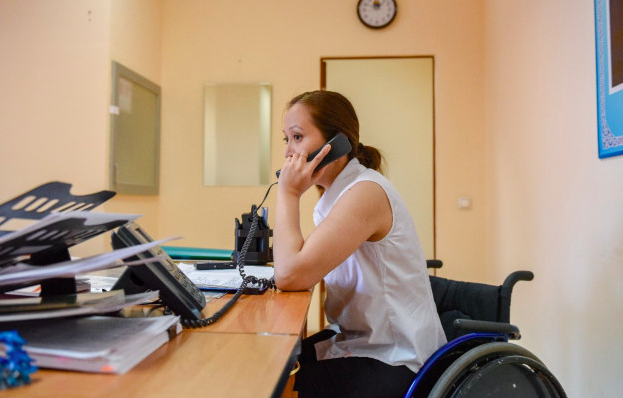ASTANA – The city of Astana plans to distribute state-funded grants to employers who create jobs for and employ persons with physical challenges, reports the city akimat (administration).
These persons include individuals with persistent health impairments of body functions resulting from diseases, defects or trauma and its consequences.
The Astana Employment Centre will provide 280,000 tenge (US$751.73) state grants to entrepreneurs who provide employment opportunities for persons with disabilities. Grants will not be issued for temporary job creation.
“These funds are to create special workplaces for persons with disabilities who have musculoskeletal disorders, including those in wheelchairs. The equipment to be provided for persons with disabilities include tables and chairs with height and angle adjustment, computers, footrests, walking aids and devices for grasping and holding objects,” said an employment centre representative.
Special workplaces are those equipped in accordance with persons with disabilities’ needs. For instance, a workplace for persons with hearing impairments, including those with complete hearing loss, will be provided with appropriate lighting, flashing lights in case of danger or evacuation and sound-to-light conversion equipment.
To receive subsidies, businesspersons may register at www.enbek.kz and submit an electronic application form, a state registration certificate copy and an equipment cost estimate to the city’s employment centre. Inquiries may be made at +7 7172 95 44 21.
According to a 2016 report by the Kazakh Ministry of National Economy’s Committee on Statistics, 651,924 persons with disabilities were registered across the country and comprise approximately 4 percent of the total population, most of whom reside in Astana. The 2017 Ministry of Labour and Social Protection report found that 17,963 persons with disabilities were employed across the country, 608 of whom were working in Astana. Low employment levels are an acute problem because these groups miss out on social integration, self-affirmation and financial independence.
Kazakhstan’s measures include the 2012-2018 National Plan for Ensuring the Rights and Improving the Quality of Life of Persons with Disabilities, which focused on enhancing their rights. Four thousand six hundred persons with disabilities were employed in permanent positions and 1,300 were employed in temporary jobs as part of its Employment Road Map 2020 programme.
To enhance their competitiveness in the labour market and engagement in entrepreneurship, 280 persons with disabilities have completed professional training, 491 have received micro credits and 156 opened their own businesses. In 2011, an inventory of existing public facilities and transport infrastructure was conducted to determine which would be subject for adaptation for persons with disabilities, and approved regional plans for adaptation are posted annually on www.enbek.kz.

